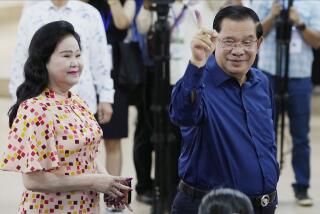Cambodian Prince’s Return Brings Thin Ray of Hope
- Share via
PHNOM PENH, Cambodia — Prince Norodom Ranariddh’s return here Monday after nearly nine months in exile has given this sad and tortured land one last stab at democracy.
If things go as hoped--although that seldom happens in Cambodia--Ranariddh, the son of King Norodom Sihanouk, and the man who overthrew him last July in a bloody coup, former Khmer Rouge commander Hun Sen, will meet in an internationally financed election July 26. The balloting, a repeat of their 1993 contest, will determine who will form a new government and fill Cambodia’s empty seat at the United Nations.
Ranariddh’s return is part of a Japanese-brokered peace plan and fulfills a major demand of the international community, which cut off most financial aid to Cambodia after the coup.
But the prince came back to a home that was looted, a political party torn asunder by defections and a country racked by distrust and violence. The present government gave him the cold shoulder--it didn’t even send anyone to the airport to welcome him. And concerns for his safety were so grave that a U.N. official and former U.S. Rep. Stephen J. Solarz traveled with him on the commercial flight from Bangkok, Thailand.
*
“Cambodia is a better country today than it was yesterday because it has taken one step in the direction of reconciliation,” U.S. Ambassador Kenneth Quinn said Monday. “There is still a long way to go and a lot of problems to overcome, but in Cambodian terms, this is not a bad day.”
Said Ahmad Yahya, a Ranariddh supporter and member of the National Assembly: “We don’t expect fair and free elections. But if they’re 70% free, we’ve got a chance. Maybe the prince will call Hun Sen and they’ll kiss each other two or three times a day and be friends again.”
But that’s unlikely. The men hate and distrust each other and have their own armies. Hun Sen has never lost the hard edge of a jungle guerrilla. He intimidates and plays rough, and few political analysts believe, regardless of the election outcome, that anyone but Hun Sen will be running Cambodia a year from now.
Though Ranariddh is a man of charm and worldliness, many of the countries that called for his return consider him politically incompetent. Even his father, the king, who lives in Beijing at the expense of the Chinese government, speaks disparagingly of him. His biggest support comes from the countryside, where people cherish the monarchy and lionize Sihanouk.
Solarz, a New York Democrat who served as a State Department envoy to Cambodia last summer, accompanied Ranariddh as a private citizen. He said the United States has a significant stake in the elections and the restoration of democracy.
“From a humanitarian point of view,” he said, “the Cambodian people were the victims of one of the century’s worst genocides, and we in America have an obligation to help them overcome that dark legacy of the past.
“And politically, Cambodia was the crown of the U.N. peacekeeping efforts. If people decide such efforts are a waste, the future of the whole peacekeeping enterprise is threatened at a time when the United States has neither the will nor the capacity to be the world’s policeman.”
Under terms of Japan’s peace plan, which thus far is on track, Sihanouk pardoned his son, annulling a 30-year prison sentence and a $54-million fine imposed on Ranariddh. The prince had been convicted in absentia on charges that he conspired with Khmer Rouge rebels and smuggled arms during the time, between October 1993 and last July, that he and Hun Sen shared power as co-prime ministers. After the pardon, fighting between the rivals’ forces stopped in northern Cambodia.
But after years of war, the horror of the Pol Pot regime’s slaughter of more than 1 million people during the 1970s and the failure of the U.N.’s $2-billion, 22,000-member peacekeeping mission, Cambodians are clearly skeptical about the future. Their nation has become the dark heart of Southeast Asia, plagued by political assassinations, random murders and kidnappings and an abundance of guns so great that the bizarre has become ordinary.
*
Lately, disco owner Victor Chao has been walking through Phnom Penh dressed in black, with cans of Mace and handcuffs dangling from his belt and two attack dogs on short leashes. His mission: to advertise his new shooting range, where customers can fire more than 70 varieties of weapons, including revolvers with silencers and rocket-propelled grenade launchers.
And on Monday, Australian Micool Brooke mingled shirtless with the airport crowd awaiting Ranariddh’s arrival, wearing from the waist up one of the flak jackets he sells.
“This will stop any small-arm round,” he said. “And if you’re worried about a bigger round, like from an AK-47, I’ve got a heavier metal sheet you insert into this pocket by the chest.”
Ranariddh originally was scheduled to stay at the downtown Cambodiana Hotel. But after an Australian businessman was killed in a room there last week, under still-unexplained circumstances, the prince and his entourage switched to the renovated Hotel Le Royal, built in 1931 during French colonial times. Security was tight. On this first trip since his exile, Ranariddh is expected to stay only a few days.
More to Read
Sign up for Essential California
The most important California stories and recommendations in your inbox every morning.
You may occasionally receive promotional content from the Los Angeles Times.













